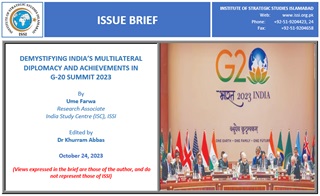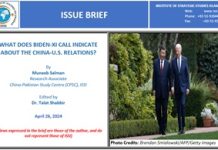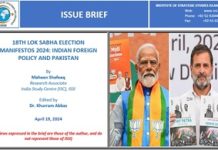Introduction
India celebrated the 18th G-20 Summit as its ‘historic’ achievement in multilateral diplomacy. The biggest reason is brokering of consensus among member states over the issue of Russo-Ukraine conflict and eventual release of the joint declaration. Before the Summit, speculation was rife in the international community whether the members of G20 would be able to reach an agreement on the divisive issue or leave this multilateral global economic forum to decay due to major power rivalries. In this context, the release of Joint Declaration, “G20 New Delhi Leaders’ Declaration” took intensive efforts by the Indian diplomats. According to India’s G20 Sherpa, Amitabh Kant, the consensus took 200 hours of non-stop negotiation, 300 bilateral meetings, and 15 drafts with their counterparts on the contentious Ukraine conflict.”[1]
For this very ‘achievement’, New Delhi garnered appreciation from the world leaders. China praised New Delhi for “sending the positive signals” through Joint Declaration.[2] As expected, Russia declared the joint communique as its “diplomatic win” because it contained no mention of Russia as an aggressor in the Ukraine conflict.[3] The western leaders also lauded the outcome of the negotiations in G20. The UK Prime Minister of Indian origin, Rishi Sunak, commented that the communique used “very strong language” about Russia’s invasion of Ukraine.[4] The White House National Security Adviser, Jake Sullivan, appreciated India for “standing up for the principle that states cannot use force to seek territorial acquisition or violate the territorial integrity and sovereignty or political independence of other states.”[5] The very fact that both Washington and Moscow are supporting the joint declaration over their most-contentious issues, nowadays, warrants an in-depth analysis of G20 Summit.















